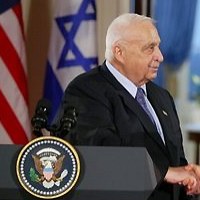![]()
Fri, Dec 16, 2011 | Rubin Reports | By Barry Rubin
U.S. Policy and Iran: Why Obama’s Bargain has Failed
The Biblical verse Deuteronomy 30 quotes God as saying: “I have set before thee life and death, the blessing and the curse; therefore choose life that thou may live….”
This notion of choice is the basis for Obama Administration policy toward Iran. And as in the Bible the “correct” choice seems rather obvious. Who would not choose “life”? Answer: The Islamist regime of Iran.
Since late 2010, when he finally decided that he couldn’t make a deal with Iran, Obama turned to his own choice scenario. Here’s how he presented it in his December 8 press conference:
“Iran understands that they have a choice: They can break that isolation by acting responsibly and foreswearing the development of nuclear weapons, which would still allow them to pursue peaceful nuclear power, like every other country that’s a member of the Non-Proliferation Treaty, or they can continue to operate in a fashion that isolates them from the entire world.”
Now, when presented like that, how could Tehran not decide it should be “acting responsibly and foreswearing the development of nuclear weapons”? And yet Iran doesn’t make the choice Obama expects. Why is that?
I suspect that you, dear readers, already know much of the answer but you can ask yourself why you haven’t heard this answer more often.
First, when even God makes humanity an “offer it can’t refuse,” humanity has still largely refused it! There is evil in the world, there are people who do not follow any religion or moral system, and there are those who do not follow their own religion faithfully. There are, for example, clergymen who lie, cheat, and steal, too.
So such bargains often don’t work. Why is that? Because people don’t believe that there are only two choices. They look for loopholes or additional options and find them, at least in their own minds.
The same applies to Iran. In international relations a key loophole is called “credibility.” If the power of the United States isn’t visible and compelling, its enemies don’t feel they need to follow its dictates or accept its definition of the situation.
Second, in addition to attacking the terms of the proposed bargain, Tehran challenges its premises. Of course, Iran is in many ways isolated and its pursuit of nuclear weapons has costs. Yet what if the costs of isolation are lower than Obama claims?
Iran has good relations with China, India, Pakistan, Russia, and Turkey (despite some minor problems in that last case). It projects extensive influence into Lebanon and Iraq. Obama’s “great achievement” — and in part it is real — has been to reduce Iran’s economic relationship to most of Europe. But, after all, the Europeans wanted this, too, and in some cases — the same goes for the U.S. Congress — they were ready to move faster and further than Obama.
Iran’s relations with countries like Britain, France, and Germany have not exactly been great during the last quarter-century even when Iran wasn’t pursuing nuclear weapons. But they are not at zero either, as numerous reports about continuing trade show.
So while Iran has definitely lost more in the last year due to Obama’s efforts how much more and is this loss intolerable? No.
Third, the Iranian regime, rightly or wrongly, judges that the benefits of having nuclear weapons are also higher than Obama thinks. Notice above in his statement, Obama does not mention a single possible benefit for Iran in having nuclear weapons! Can he list them and show they are bogus? Of course the Iranian regime knows the truth even if the American people don’t.
Let me list some of the advantages for Iran in having nuclear weapons:
— Virtually guarantees that the United States won’t attack Iran no matter what the Tehran regime does, as long as it doesn’t use nuclear weapons.
— Regional states will kowtow to Iran out of fear of its power.
— Shia Muslims are more likely to look to Iran for leadership. They and Muslims in general, will be more likely to see revolutionary Islamism as a winning ideology, to join Islamist groups, and to commit terrorism.
— Within Iran, despite a lot of opposition, there will be a patriotic enthusiasm about the great power their country enjoys. And simultaneously the opposition will be even more intimidated.
— Nuclear weapons could be used against Israel if the regime wants to do so, judging the value of revenge, hatred, and religious fanaticism to be greater than the cost of having millions of Iranians killed. With this regime, that decision cannot be ruled out.
Now, when you compare that list of advantages to the list of disadvantages — international isolation and a loss of oil sales and investments — the picture doesn’t look so bad, does it? Especially if your main concern is strategic and not economic issues.
Fourth, the one specific benefit that Obama offers, that Iran could still have “peaceful nuclear power,” is no great benefit for Tehran. With its massive energy resources, that’s the last thing Iran needs. And if peaceful nuclear power is so great why isn’t Obama, or any other president, seeking that for the United States?
Finally, we come to what many call the rationality issue but which I prefer to call the Iranian regime’s analysis of the balance of forces and willingness to take risk. One of the most common expressions by Islamists is that the weak-kneed West prefers life but the “true” Muslims prefer death and that’s why they will win.
If you are willing to court death then how much is a little international isolation going to scare you?
And while we’re at it, consider the modern history of revolutions. Every revolutionary country faced isolation: eighteenth-century France, Bolshevik Russia, Communist China and Cuba. If you are a revolutionary seeking the destruction of everyone else you expect them to be your enemies and try to isolate you, and do much worse, too.
Therefore, Obama’s proposition is completely bogus. Now, in what used to be the normal USA, there would be lots of newspaper articles, television news items and shows, editorials, experts, foreign policy establishment dignitaries, and academics, etc., who would be pointing this out. Yet this kind of thing rarely or never happens nowadays. Sure, there are certainly critics — at least outside the MSM — but how many present a sophisticated analysis that could convince policymakers?
All of this doesn’t mean that someone should attack Iran militarily. The alternative strategy is a coherent strategic campaign to counter Iranian influence on every level — nuclear weapons are only a part, I’m tempted to say a small part, of the problem — by allying everyone threatened by Iran. This is an idea that has not even entered the national debate on this issue.
But Obama’s argument on Iran — the one he will surely use in his run for reelection — is nonsensical.



 RSS
RSS











U.S. Policy and Iran: Why Obama’s Bargain has Failed | Middle East, Israel, Arab World, Southwest As http://t.co/PZjvrHoX
U.S. Policy and Iran: Why Obama’s Bargain has Failed | Middle East, Israel, Arab World, Southwest As http://t.co/PZjvrHoX